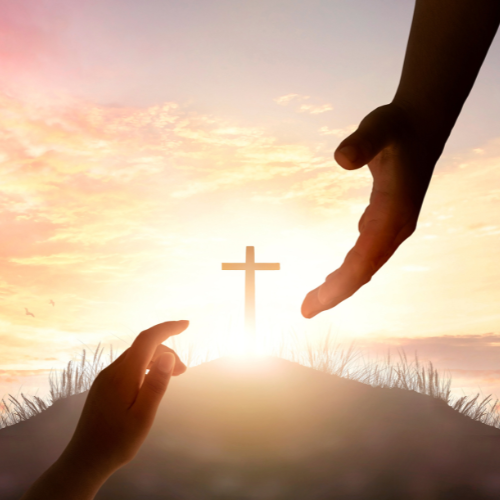The end is near.
- Gethsemane Lutheran Church
- Nov 16, 2025
- 7 min read

Can you tell that the end is near? The end of the government shutdown—good, that’s a start. The end of the calendar year in about 7 more weeks.
I wish we could say we’ve seen the end of people living irresponsibly, as we heard about in the second letter to the Thessalonians, along with the command “anyone unwilling to work should not eat.” So here’s your public service announcement for today: Biblical warnings about idleness—unwilling to work—were about the RICH, not the POOR, meaning that people who were born wealthy enough to not have to work should still work anyway. I wish it was the end of wealth inequality, but we’re still waiting on that.
There IS an actual end that is near: we’re very near the end of the church’s liturgical year. We’re still in the long season of Pentecost today and next Sunday, then Advent begins a whole new liturgical year.
And during this past year of reading mostly from Luke’s Gospel and accompanying Scripture texts, we only hear from the prophet Malachi twice: on the second Sunday in Advent—so that was last December—and today, on the second-to-last Sunday of the liturgical year.
So we don’t hear a lot from Malachi, reminding the people of God who have been restored after the Babylonian exile that, even if they have things going for them in the moment, it still matters how they treat one another because God still sits in judgment of evil.[1] And maybe you didn’t realize until today that we repeat his poetry in a favorite Christmas carol:
(tune of “Hark! The herald angels sing” ELW 270)
“Hail the heaven-born Prince of peace! / Hail the Sun of righteousness!
Light and life to all he brings, / risen with healing in his wings.” . . .
You’ve heard it from “Hark! The herald angels sing,” and you probably imagined happy angels and stuff. But this I found in one of our Lutheran worship resources a suggestion to rewrite the lyrics of this hymn to reflect more of Malachi’s words:
(big powerful voice)“Let the evil burn to stubble. / May they wither, branch and root.
Raging fire, like an oven, / Burn them up, oh Lord of heaven.”[2]
(small voice) Hark! The herald angels sing, “Glory to the newborn king!”
It…doesn’t sound like what we’d probably prefer to sing. Can we take God’s judgment as seriously as we take God’s grace? And not just for the sake of imagining exactly who we’d like for God to burn up, but for the call to humility that comes from practicing grace ourselves.
This month’s front cover of Sojourners magazine caught my attention with the headline: “Don’t burn out in doing good,” and the subtitle underneath it, “How to find the link between grit and grace.” Anyone else curious? The article inside, by Christine Jeske, is titled “How to Pursue Justice for the Long Haul.” Which sounds like exactly what I want to do, and what I feel like I consistently fail to do.
The article is written by Christine Jeske, professor of anthropology at Wheaton College. After years of teaching every semester about social injustice, she wrote that she became consumed by a doubt—“Does it work? Does teaching about the historical and present effects of racism and other injustices lead to lasting changes in people’s lives?”
She researched this by centering people of color, specifically interviewing faith leaders of color, “asking them to describe positive and negative examples of racial justice advocacy,” then asking them to recommend white Christians they had seen working for racial justice for the long haul. She wrote a book about the patterns that emerged from the lives of these people who have engaged in the struggle for racial justice and what leads to resilience.
It starts with noticing moments of what she calls a “collision,” where “your imagined picture of how society works and is supposed to work is smacked by reality so hard that you can’t ignore it.” Then the next step of resilience is to ask why, which requires time sitting with the questions and “doing the work” of unsettling what she calls “false social imaginaries, building more accurate understandings of how society works, including what goes wrong.”[3] This discipline of asking why becomes a lifelong process.
Jeske writes, “Collisions and asking why bring us face to face with a troubling reality: People hurt people. And those hurts don’t just go away. They leave us tender, traumatized, or tiptoeing.”[4]
Perhaps you know what it feels like to be tender or traumatized or tiptoeing. These same words could probably describe the community of believers who followed Jesus in the time that Luke was writing his gospel. Luke’s gospel was written after the temple already had crumbled, so how can believers make sense of Jesus’s words when persecution and martyrdom are going on all around them, and how long are they gonna have to persevere through all this?
Jesus had promised them that “many will come” in his name saying “I am he!” and “The time is near!” And what does Jesus say about them? Do not go after them. Do not go after the ones who provide easy answers, the ones who promise safety and security, the ones who announce victory by way of domination.
Domination. is not. the way. Of. the cross.
Instead, Jesus says, expect persecution that can come from anywhere, even from within the religious community or from the civil authorities, and expect betrayal from parents, siblings, relatives, and friends. And you won’t get an invitation to a meeting with the king or the governor—you’ll be dragged before them, and that’s your chance to testify.
But don’t prepare your defense in advance! Now that’s a pretty weird message from Jesus if he’s saying DON’T be prepared, but this doesn’t mean “give up” or “don’t do anything”—it means don’t try to control the outcome. Trust the Holy Spirit, who will remind you of the words of Jesus, who gives you “words and a wisdom” that will endure. And “words and a wisdom” is not equivalent to a full script; whatever words are needed will be provided in the right time, and in the end, “By your endurance, you will gain your souls.”
How do people endure or persevere for the long haul? What builds resilience? Christine Jeske says they practice rugged grace. Jeske writes:
“Grace is a word that has so often been weaponized against people experiencing injustice that it’s sometimes avoided in justice conversations, even by Christians who consider grace to be the core of our faith. Practicing rugged grace doesn’t mean telling victims to “get over it,” “forgive and forget,” or “let the dominant group off the hook.” Grace—both giving it and responding to it—might be the toughest thing you ever do. In more than half of my interviews, people used the word grace or the related terms mercy or forgiveness. Many more told stories of grace using terms like surprised, unexpected, undeserved, indebted, and forgiven. When I listened back through my research interviews, I realized that nearly every time someone cried, it happened when they told a story of grace.
“Here’s what rugged grace has to do with justice: Grace happens when someone owed a debt is able to freely—not under compulsion—give back something to a person owing the debt, in a way that anticipates but does not demand a future response. As one white man put it, “You don’t get to demand grace. If you do, you’ve missed the whole point! As soon as you say, ‘Hey, I deserve grace,’ that’s not grace anymore.”
…“When I talked to people of color, they emphasized that giving grace for injustice is not easy, but for them it’s what makes justice possible and sustainable. One Black man told me, “If our thing is reconciliation to Jesus and reconciliation to the Father, and that’s through unity, that’s through love, the only way we can do that is by giving grace. Grace has to be the core of what we’re doing.”[5]
When we’re talking about injustice and inhumanity, it’s hard to keep grace in mind, but I think that’s why Jeske calls it rugged grace—maybe imperfect or rough-around-the-edges, but keeps showing up and keeps staying connected even when it’s tempting to either fight back or even utterly give up or disengage. Practicing grace may mean noticing the good things you have received without deserving them, not least of which is God’s unconditional love. By your endurance, you will gain your soul.
Jeske writes:
“Long-term activists don’t expect cheap grace to whitewash past harms, nor do they wallow in unresolved guilt or bitterness. One white man described how he navigates his fear of falling short in intercultural settings.
“I’m terrified,” he said. “I know that I could really cause some
damage. ... I am scared that someday someone’s going to ask me to
do something to prove that I’m antiracist enough and I’m going to
feel like I don’t want to do that. But I’m still going to show up. I’m still
going to be here. I’m still going to trust God even if I don’t understand
all the time or I’m still working through it.”[6]
Jeske concludes: “Grace doesn’t let people off the hook. Instead, it hooks us into ongoing relationships of passing grace forward.”
That, my friends, is the work to which we are called: to be agents of rugged grace in a messy and broken world. Jesus had faith in us long before we were here, and Jesus will sustain us with words and a wisdom that our opponents will not be able to withstand or contradict.
May God bless us with the same rugged, persistent grace that is the source of all healing—the beginning of everything as well as the end.
Amen.
Pastor Cheryl
[1] Helpful commentary by Cory Driver at https://www.livinglutheran.org/2022/11/lectionary-blog-after-things-fall-apart/
[2] From Sundays and Seasons worship resources for Sunday, November 16, 2025.
[3] Christine Jeske, Sojourners magazine, November 2025, https://sojo.net/magazine/november-2025/two-and-half-steps-toward-more-resilient-activism
[4] Ibid.
[5] Ibid.
[6] Ibid.
.png)





Comments